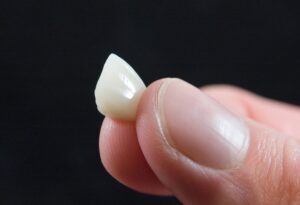 If you need a dental crown, don’t worry about a long recovery. The protective cap is placed over your tooth, covering the entire surface to your gum line. Crowns provide long-lasting results to improve the health, function, and appearance of teeth. However, you’ll require a minor procedure to prepare your tooth for your crown placement. Here’s what to do after getting your restoration to ensure your investment lasts.
If you need a dental crown, don’t worry about a long recovery. The protective cap is placed over your tooth, covering the entire surface to your gum line. Crowns provide long-lasting results to improve the health, function, and appearance of teeth. However, you’ll require a minor procedure to prepare your tooth for your crown placement. Here’s what to do after getting your restoration to ensure your investment lasts.
Tooth Preparation for a Crown
Your dentist must reshape your tooth to allow a crown to fit over it. They may use a local numbing agent to block any pain during the procedure. Although you may feel some pressure or unusual sensations, you won’t have any pain.
After your tooth has been prepared, your dentist will take an impression of your mouth to get the measurements needed to create your crown. The digital impression will be sent to the dental lab. It can take the lab a couple of weeks to make your restoration, so your dentist will apply a temporary crown while you wait.
Placing Your Final Restoration
Your temporary crown will protect your tooth until receiving your final restoration. It won’t be as strong as your permanent crown, so you’ll need to eat soft foods to avoid damaging it. After the lab sends your crown back to your dentist, you’ll return to have the temporary material removed and your high-quality restoration bonded to your tooth.
Dental Crown Recovery
Although you won’t feel anything during your procedure, your mouth may be tender for a few days after the effects of any numbing agents wear off. You can manage it using an over-the-counter pain reliever. Eat soft foods and avoid anything hot or cold to prevent sensitivity.
Dental Crown Aftercare Instructions
Your dental crown can last for 10 years or more with the correct care. You can get the most from your restoration by following a few tips:
- Brush and Floss Your Teeth: Use a soft-bristled toothbrush and non-abrasive toothpaste to clean your teeth for 2 minutes twice per day. Use floss or a water flosser to clean between each tooth daily. Give extra attention when cleaning where your crown meets your gum line.
- Eat Nutritious Foods: Limit your consumption of sugary foods and drinks to keep tooth decay at bay. Avoid eating hard or sticky foods to prevent damaging your crown.
- Treat Bruxism: Ask your dentist for a nightguard if you grind or clench your teeth.
Besides caring for your mouth at home, visit your dentist every 6 months for a cleaning and checkup. They’ll keep your teeth and gums healthy to promote your dental health and the life expectancy of your crown.
About Dr. Alexandra Kulwin
Dr. Kulwin achieved her dental degree from the Indiana University School of Dentistry and has continued her education in cosmetic dentistry and dental crowns. She is affiliated with several professional organizations, including the American Dental Association. Request an appointment through her website or call (513) 647-3001.
